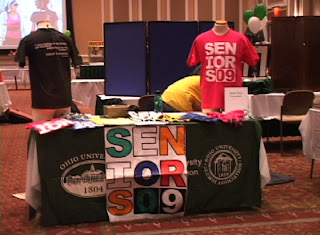Megan Gorey
mg908407@ohio.edu
It’s not hard for reporters to be affected by the story they are covering. Going to a location where a story unfolds or talking to people with raw emotion makes a compelling piece, not just for the audience but for the journalist too. At times, it can even be hard to keep your composure when covering a crisis or tragedy. At the end of the day, reporters are people too.
T-Minus 3 Months
As I began to research my story about the Ohio University Graduation Fair and the number of students enrolling in graduate programs, I could feel the panic slowly creeping up on me. The journalistic half of my brain was excited with all the great information I was collecting for my story. But the soon-to-be-graduate part of my brain was ringing the alarm of reality: I’m graduating in three months.
Creativity Is Key
My first interview was with Brittney Buxton, the Interim Assistant Director for theCareer Services Office. Buxton had a lot of encouraging information about the services that Career Services offers including Tool Kit Tuesdays and Career Fairs. "I don't think it is going to be harder (to find jobs), we just might have to be more creative,” Buxton says.
Brittney Buxton explains what students need to do in order to find a job
Alumni Pains
Buxton also said that she’s noticed more alumni coming back to utilize the Career Office to find jobs and network after losing their current jobs. As the interview progressed, I felt myself slowly slouching into my chair. Maybe there’s still time to flunk all my classes and delay going into the “real world.”
Brittney Buxton reports a lack of on-campus recruitment
Students can no longer rely on jobs coming to them and Buxton says more students are walking out the door after graduation without a job lined up. This is probably why the Fall Career Fair was the biggest event yet – so many students are being realistic about the job market. “Some (students) are lethargic but others are acting out and preparing,” says Buxton.
Experience Necessary
Graduating from college seems bittersweet. I will miss Ohio University and the lifestyle, but not so much the grind of studying. I was planning on going straight out into the work force after graduation. I’m eager to use all this new journalistic talent I’ve acquired over the past four years. And I’m hopeful to get that “big break” and find my place among the big 10 Networks. But, I’m already finding that employers want you to have years of experience before they will even consider looking at your application.
Question: How can I get experience IF NO ONE WILL HIRE ME?
Bachelor's Degree is the New GED
The director of Lifelong and Distance Learning, Marsha Ham, didn’t make me feel much better during an interview with her. She explained that many alumni are using this opportunity in between jobs to go back and finish up their Master’s degrees. "People find themselves saying if I get more skills and get more credentials; it will be more valuable when the economy improves,” Ham says.
Marsh Ham talks about the expectation of employers
On the Horizon
I bought my senior class of 2009 shirt. The quote on the back reads “I have nothing on my horizon except everything. I have everything on my horizon,” Dwight Schrute from NBC's The Office. Although the quote is meant to be funny because of the nature of the Dwight Schrute character, it actually rings true.
I think this story was an eye-opening experience that gave me a quick dose of reality and help to ward off that dreaded senioritis. I’m still going to hold my head high as I push on towards graduation day and continue in my search for a job as either a reporter or anchor. The way I look at it is that even if there are no jobs – someone still has to report on that!
skip to main |
skip to sidebar


Featured Links
Story Archive
-
▼
2009
(135)
-
▼
February
(33)
- REPORTER BLOG: Feminisim in 2009?
- REPORTER BLOG: Pink Hoops
- REPORTER BLOG: Got Marrow?
- REPORTER BLOG: What Happened Was...
- REPORTER BLOG: Sewers in the Media
- REPORTER BLOG: Graduation Freak Out
- REPORTER BLOG: Every Day is a New Day
- College Graduates Weigh Options in Current Economy
- REPORTER BLOG: Diving into Less Popular Sports
- Stimulus Plan to Help Athens Sewer Division
- Empowering Women in Athens
- Housing Stability in Athens
- Reporter Blog: Polar Plunge
- Budget Cuts May Lead To Water Woes
- Meningitis Case on OU Campus
- REPORTER BLOG: Brick by Brick
- REPORTER BLOG: Pink Sex Offenders
- REPORTER BLOG: Sensitive Subjects
- REPORTER BLOG: Calling People Out
- REPORTER BLOG: Growing Up Out in the Field
- REPORTER BLOG: Basketball, The Beautiful Game
- Athens City Council Cuts Budget
- City Council OK's Carpenter Street Reconstruction
- Sex Offenders Listed, A Few Names Retracted
- Red Day Highlights Heart Problems in Athens
- REPORTER BLOG: Assignment--Get Reaction to Governo...
- Athens Reacts to Proposed New Rules for Schools
- REPORTER BLOG: No Business like Snow Business
- REPORTER BLOG: Surviving The Streets
- REPORTER BLOG: Community Health Programs help in m...
- OU’s Community Health Programs Keep an Eye on Stat...
- REPORTER BLOG: Sports Rookie
- Ice Storm 'Good' for Local Business
-
▼
February
(33)
topic(s) covered:
- athens ohio (1)
- blog (57)
- city website (1)
- news (72)
- pets (1)




No comments:
Post a Comment